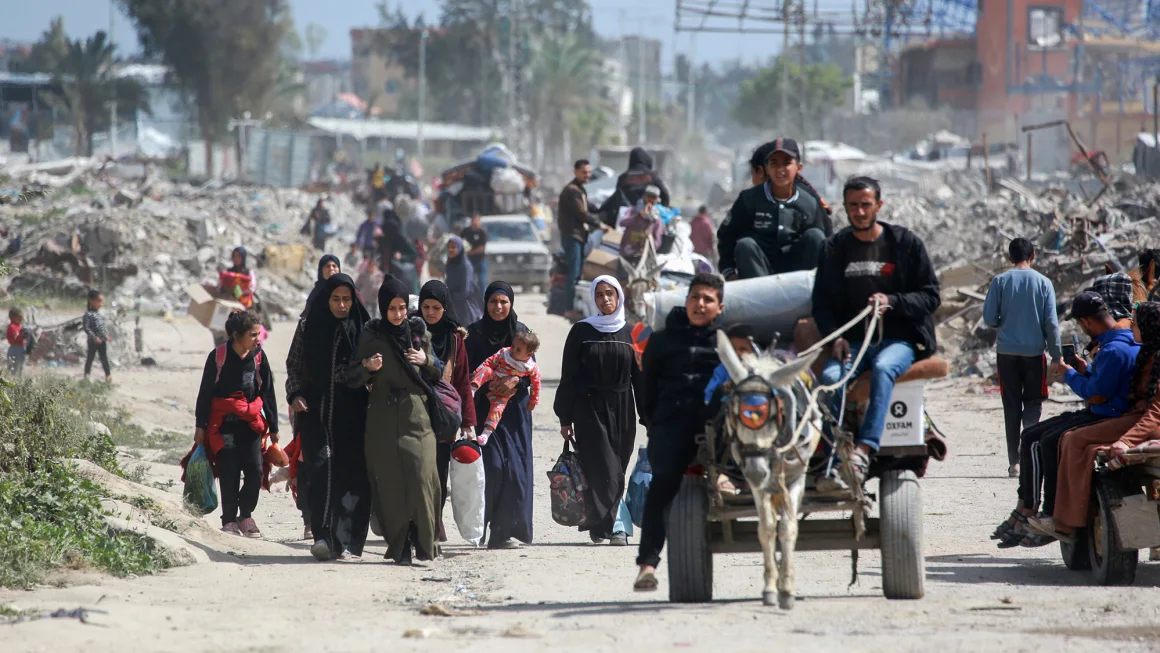Foreign
‘Animals at a zoo’: Released hostage describes terrorists bringing civilians to observe him

After murdering the Sharabi’s family dog, terrorists abducted the family and Ofir Engel to Gaza and subjected them to psychological torment.

Released hostage Ofir Engel revealed the mistreatment and abuse Hamas terrorists subjected him and his girlfriend’s family to on Oct.7 and as captives in Gaza in an interview with the Jewish News Syndicate published on Thursday.

The now-19-year-old Engel was abducted from Kibbutz Beeri on Oct.7, where he was observing Simchat Torah with his girlfriend Yuval Sharabi and her family. They were sleeping at 6:30 in the morning when rocket sirens woke them. He was 17 at the time Hamas abducted him.
“But the [sirens] didn’t stop,” Engel told JNS. “After two-and-a-half hours, friends started sending scary messages about hearing terrorists outside their houses and pleading for the army to slowly realizing the seriousness of the situation, Engel read of the news of the invading terrorists – learning of the ongoing massacre from survivors and witnesses. The terrorists would soon make their way to the Sharabi home.
“After six hours, we heard a large ‘boom’ coming from the entrance to the house. We heard terrorists roaming around inside while we were still all in the safe room,” he recalled. “A few minutes later, they tried opening the door to the room. Yuval’s dad, Yossi, was holding it closed. But he wasn’t able to overcome the three terrorists pushing it open.”
When the terrorists eventually forced their entry into the safe room, Engel said the first thing they did was shoot the family’s dog.

Ofir Engel, released from being held hostage by Hamas terrorists in Gaza attends a press conference for the foreign media in Kibbutz Be’eri near the Israeli-Gaza border, southern Israel, December 20, 2023. (credit: YONATAN SINDEL/FLASH90)
“They entered armed. The first thing they did was shoot Yuval’s dog. They then pointed their guns at us,” he described. “They made us sit outside on the grass with the neighbors, the Shani family. Smoke was everywhere, as was the smell of gunpowder.”
The family was later taken to Gaza where they were held captive.
“They put Yuval’s father inside. Yuval and I were holding hands. At first, they put us both inside, but then they signaled to her to get out. They put Amit Shani, the young son of the neighbor, inside instead, and we drove away, speeding like crazy,” Engel said. “The last image I had of Yuval and all of her family, other than her father, was of them on the side of the road surrounded by two armed terrorists as we drove away. I was sure they either had been kidnapped or were murdered that day.”
After arriving in Gaza, terrorists interrogated them on their background, army service and age, Engel said. Civilians would later be invited to observe and laugh at them.
“One of the terrorists called his friends and family, even his mother, to come observe us. They looked very happy, laughing and smiling. We felt like animals at a zoo,” he said. “At night, they moved us to another house. There, we slept on a couch with eight armed terrorists who kept yelling at us in Arabic. They seemed like they hated us and were ready to shoot us in the head at any second.”
For 26 days, Engel remained hostage in that home – needing to ask permission to go to the bathroom, and not being allowed to stand.
“We slept on mattresses on the floor. They gave us two pieces of bread a day, cheese, canned meat and a quarter of a bottle of water,” he recounted. “They also gave us cards and we played from morning to night. Sometimes, we even played with the terrorists. But we never let them win. We didn’t want to make them feel like they were beating us at anything.”
Engel explained that after 26 days, he and two other hostages were moved to the house of a Hamas commander.
“He was a very mean man. He didn’t let us speak at all. He locked us inside a room and kept telling us we’d die in Gaza,” Engel said.
Around 14 days later, terrorists arrived to record two hostage videos of the three captives. Engel testified that they were instructed to say that Hamas was taking care of them, feeding them, and that Israel should make a deal for their return.
In the second video, Engel and the others were told to say they were only given three dates and half a glass of water – and they could not survive on this.
“We thought it was a good thing. We believed they would release the clips and our families would know that we were alive,” Engel said. “But they never published them.”
A little over a week later, Engel described how terrorists arrived demanding they write goodbye letters to their loved ones, telling them they would die.
“I wrote to Yuval, to my family, to my friends,” Engel said. “I wrote a whole page, maybe even more. It was terrifying because they’d just come and say something like that and you couldn’t know whether it was true. We told ourselves that if they asked us to write the letters, it was probably true. We wrote in fear; went to sleep terrified; and realized the next morning that it wasn’t real—that they’d lied to us again. The fear kept growing and with each passing day, there was less food.”
A few days later, on day 53 of captivity, the three hostages were moved for the third time.
“It was nighttime and dark. We couldn’t see much. Suddenly, in the middle of the street, they separated Sharabi from us and took him away. It was the last time I saw him; we didn’t even get to say goodbye,” Engel said. “In captivity, I felt scared constantly, because at any given moment those terrorists who hated me could have killed me. Yossi [Sharabi] was like a father. He always helped and gave us hope. He kept saying we would make it out. I don’t know what I would have done without him.”
They were taken to a building and told that they would be returning to Israel – but they didn’t believe the terrorists at the time.
After some wait, they were transferred to a vehicle with two women in Islamic garb.
“They took us from there by car with two women dressed in jalabiyas whom we assumed were Arabs. But suddenly, one of them whispered in Hebrew, ‘Do you speak English?’ I was in shock. I didn’t answer. She asked again and I said, ‘yes.’ She explained they were also captives and that we had to be quiet,” he recounted.
The two women were Moran Stella Yanai and Raya Rotem, who are now free from Hamas.
Instead of being taken straight to the Red Cross team, they were taken to a house with more female hostages.
“In that house, there were lots of terrorists, but they were much nicer,” Engel said. “They gave us many pitas, drinks and sweets. They wanted us to go back with good feelings and say we were treated well, but we weren’t.”
“We stayed there until the morning when they moved us to what would be our last location before handing us to the Red Cross. They said the confirmation from Israel would come at 6 p.m. Meanwhile, more hostages arrived, including Itay Regev, Liam Or and Liat Atzili. We welcomed them and gave them food. I knew Liam through Yuval. We looked at each other and asked, ‘What are you doing here?’ The situation was absurd.”
In the hours leading to their release, Engel described how the terrorists continued to inflict psychological torture methods – telling them that Israel didn’t want them back.
“They put all 11 of us in a big van and drove to meet representatives of the Red Cross. They took us out of the van and delivered us in pairs. There must have been 200 armed, masked terrorists around.
“We were then taken to Gaza’s Rafah crossing with Egypt, where we encountered the first Israelis who weren’t hostages, and we finally knew we’d be OK. They took us to Israel’s Kerem Shalom crossing and then to the IDF Hatzerim base.
“I had no idea what had happened to Yuval and her family. I asked one of the soldiers on the bus from Kerem Shalom to Hatzerim if she knew, and she said that they were alive and well. I started crying like a 3-year-old because I’d been sure they were dead.”Engel was reunited with his parents and shortly after his girlfriend.
“Suddenly, I’m coming back. I’m returning home, and I realize she’s alive and I see her. So many life-changing events happened in less than 24 hours. It was crazy,” Engel said.
Hamas announced that Yuval’s father Yossi was dead on day 97. The IDF would later confirm this to the family.
“It was very tragic for me because I was with him for two months,” said Engel. “We were held in the same room. I knew he was OK; I knew he was feeling fine. But time there had an impact. As time passes, hostages die and we don’t want them to return in coffins. We want them alive.”
“Physically, I’m OK,” Engel said. “Emotionally, I can’t do anything for myself because the fact that there are still hostages held in Gaza prevents me from starting to recover. If I were still a hostage, I would want everyone who returns to do everything they could to help me. Traditionally, the IDF knocks on a family’s door to announce that a loved one is gone. This is almost the only opportunity Israel ever had to knock on the doors of those people and say that their loved ones have returned.”
Over a 100 hostages now remain in Hamas captivity. International efforts for a release-ceasefire deal failed to come to fruition after the initial November deal.
Eight living hostages have been rescued by the IDF, and the bodies of others have been recovered. It is believed that 48 hostages have been killed in captivity, according to IDF estimates.

Foreign
Hamas claims spokesperson killed in Israeli strike on northern Gaza

Earlier this week, Israel killed Ismail Barhoum, a member of Hamas’ political office, and Salah al-Bardaweel, another senior leader.

Hamas spokesman Abdel Latif al-Qanou was allegedly killed in an Israeli airstrike on northern Gaza, Hamas-affiliated news agency Shehab reported on Wednesday night.

Al-Qanoa was one of Hamas’s most prominent spokesmen in Gaza, and while he avoided media appearances during the months of fighting, he gave multiple interviews to Arab news channels after the ceasefire.
Al-Qanoua was killed when his tent was targeted in Jabaliya, the Hamas-run Al-Aqsa television reported. The same strike wounded several people, medical sources said.
Earlier this week, Israel killed Ismail Barhoum, a member of Hamas’ political office, and Salah al-Bardaweel, another senior leader.
Both Bardaweel and Barhoum were members of the 20-member Hamas decision-making body, the political office, 11 of whom have been killed since the start of the war in late 2023, according to Hamas sources.
Tents for Palestinians seeking refuge are set up on the grounds of a United Nations Relief and Works Agency for Palestine Refugees (UNRWA) centre in Khan Yunis in the southern Gaza Strip on October 19, 2023, amid the ongoing battles between Israel and the Palestinian group Hamas (credit: MAHMUD HAMS/AFP via Getty Images)
The IDF has yet to comment on the alleged elimination.
Increased IDF pressure in the Gaza Strip
Since fighting in Gaza was renewed at the beginning of last week, the IDF has killed 150 terrorists, including 10 top Hamas officials, The Jerusalem Post learned Tuesday.
In certain areas, the military has entered a full kilometer into Gaza, such as around the Nitzanim Corridor in central Gaza.
In addition to central Gaza, Beit Lahia, Beit Hanoun, parts of Khan Yunis, Shaboura, and Tel Sultan, the IDF has been evacuating and moving into Jabaliya.

Foreign
Dead Nigerians, Africans, others without will may lose unclaimed estates in UK

Hundreds of unclaimed estates reveal untold stories of African migration, wealth, and family ties left behind.
Thousands of people die every year in the United Kingdom without leaving a will or identifying next of kin, and among them are many Nigerians and other Africans whose estates—ranging from property to savings—remain unclaimed.
The UK government’s latest list of unclaimed estates, updated daily, includes over 170 entries connected to African-born individuals, with Nigerians making up a significant portion of the cases.

A Legacy Lost
For many migrants, the UK became a home away from home—a land of opportunity where they built wealth, purchased property, and created a life.

However, the absence of a will often results in their assets being classified as “bona vacantia” (ownerless goods), leaving them to the custody of the Crown.
Families back in Africa are frequently unaware of these estates, leading to a permanent loss of assets.
Cases like that of Adenike Adebiyi, who passed away in Hackney, London, in 2004, or Solomon Adekanmibi, who died in Colchester, Essex, in 2021, highlight the consequences of dying intestate.
With no identified next of kin or missing documentation, their estates remain unclaimed, and their legacies risk being forgotten.
Why It Matters
This phenomenon underscores a critical issue: many African families are unaware of their relatives’ financial situations abroad.
Migration often disrupts communication, and without clear documentation, the wealth built overseas remains beyond reach.
The loss isn’t just financial—it’s deeply cultural and emotional. Unclaimed estates represent untold family histories, connections, and the struggles of migrants who built their lives in the diaspora.
The Challenges
Lack of Awareness:
Most families in Nigeria and other African countries are unaware of their relatives’ estates abroad or how to access them.
Genealogical Gaps:
The information provided in official records is often incomplete. For example, many entries in the UK unclaimed estates list lack detailed family history or next-of-kin information.
Cultural Hesitations:
In many African cultures, discussing death and wills is considered taboo, leading to reluctance in planning for asset distribution.
A Call to Action
African governments, community organizations, and legal professionals need to raise awareness about this issue.
Here’s what can be done:
Encouraging Will Writing: Migrants in the diaspora should be educated about the importance of drafting wills to protect their assets.
Genealogical Support: Families in Africa can be assisted in tracing unclaimed estates through local or international partnerships.
Public Awareness Campaigns: Social and traditional media can highlight the importance of estate planning and share resources for families.
How to Check the List
The UK government maintains a public Unclaimed Estates List that is updated daily.
Families can search the list by name, place of birth, or other identifiers to check for potential claims.
Final Thoughts
For many Nigerians and Africans in the UK, their unclaimed estates represent more than just wealth—it’s a story of migration, resilience, and identity.
By addressing this growing issue, families can reclaim their heritage, and the legacy of those who journeyed to the diaspora need not be forgotten.
Here is the latest daily update as of March 24, 2025. Check the list

Foreign
Israel approves controversial proposal to facilitate emigration of Palestinians from Gaza

Israel’s security cabinet has approved a controversial proposal to facilitate Palestinian emigration from Gaza, a move critics warn could amount to ethnic cleansing.

Israeli Finance Minister Bezalel Smotrich on Sunday said the security cabinet approved the proposal by Defense Minister Israel Katz to organize “a voluntary transfer for Gaza residents who express interest in moving to third countries, in accordance with Israeli and international law, and following the vision of US President Donald Trump.”

The decision marks a remarkable endorsement of a plan once considered a far-right fantasy – and comes despite the prime minister’s earlier pledge not to permanently displace Gaza’s civilian population.
Critics have said that any mass displacement of Gazans in the midst of a devastating war would amount to ethnic cleansing, an act associated with war crimes and crimes against humanity under international law. Israeli officials have countered that emigration would be voluntary and in line with international legal standards.
But aid groups argue that Israel’s war has made life in Gaza nearly impossible. Martin Griffiths, the United Nations’ top emergency relief official, has called the enclave “uninhabitable,” saying its people are “witnessing daily threats to their very existence.”
The Israeli approval would establish an administration within the defense ministry “to prepare and facilitate the safe and controlled movement of Gaza residents who wish to voluntarily move to third countries,” according to a statement from the defense ministry.
Its work would include “establishing movement routes, pedestrian checks at designated crossings in the Gaza Strip,” and infrastructure to enable people to leave.
Israeli officials have presented the plan as a fulfillment of a desire by Trump to take over Gaza, expel its Palestinian population to neighboring countries and turn it into a Middle Eastern “riviera.”
The Palestinian Authority’s Minister of State for Foreign Affairs Varsen Aghabekian Shaheen told CNN’s Becky Anderson last month that Palestinians “are steadfast to stay in their land and will not move.”
Trump’s ‘vision’
Katz said Sunday that Israel is using “all means to implement the vision of the US president,” according to the defense ministry statement.
This month, Trump appeared to backtrack on his comments about displacing Palestinians, telling reporters that “nobody is expelling any Palestinians.” Steve Witkoff, the US special envoy to the Middle East, said last month that the US initiative to rebuild Gaza won’t necessarily amount to an “eviction plan” and that it was designed to “shake up everybody’s thinking.”
Last year, Israeli Prime Minister Benjamin Netanyahu said his country had no intention to displace Palestinians or occupy Gaza.
Related articleTrump says ‘nobody is expelling Palestinians,’ weeks after saying they should be moved to Arab states
“I want to make a few points absolutely clear: Israel has no intention of permanently occupying Gaza or displacing its civilian population,” Netanyahu said in a video statement in January 2024.
Trump’s proposal has, however, brought the idea further into the mainstream, with Israeli politicians now openly discussing mass emigration of Gazans as a solution to the war. And Katz last week said that Israel may maintain a permanent presence in the enclave.
Israeli rights group Peace Now criticized the plan, saying “the establishment of the administration to expel Palestinians from Gaza is one of the stupidest moves by a government that has lost all direction and logical thinking.”
The prospect has also drawn sharp rebuke from Arab leaders, especially Egypt and Jordan, who would be expected to absorb the large number of expelled Palestinians. Experts have also warned that displacing Palestinians would further destabilize the region and threaten the security of neighboring states.
Smotrich said Sunday that the security cabinet also approved the expansion of Jewish settlements in the occupied West Bank, noting that 13 areas in the West Bank would be split from existing settlements and would be recognized as independent settlements.
“Instead of hiding and apologizing – we are raising the flag, building, and settling. This is another important step on the path to actual sovereignty in Judea and Samaria,” he said, using the name by which Israelis refer to the West Bank.
The Yesha Council, an umbrella body representing Jewish settlements, said that as of January 2024, there were 150 settlements in the West Bank.
It said that the decision exposes a “long-standing lie that (Israel) does not establish new settlements, but only ‘neighborhoods’ of existing settlements” and that it is “another nail in the coffin that the Government of Israel is preparing for the only chance for a future of peace and security.”
A statement sent by Smotrich’s office said the move comes against “the backdrop of the approval of tens of thousands of housing units in Judea and Samaria and represents another significant step in the process of normalizing and regulating the settlement.”
Smotrich and other right-wing ministers have been pushing an aggressive expansion of settlements on the path to declaring Israeli sovereignty over the West Bank, which would be in defiance of international law and UN Security Council resolutions.
Israel says it will maintain ‘permanent’ presence in Gaza unless hostages are freed

-

 Politics1 week ago
Politics1 week agoOpposition leaders announce coalition to challenge Tinubu in 2027
-

 Foreign1 week ago
Foreign1 week agoHouthis declare Ben-Gurion Airport ‘no longer safe’ after renewed Gaza fighting
-

 News1 week ago
News1 week agoUmeh denies receiving $10,000 with other 42 Senators to support state of emergency in Rivers
-

 News1 week ago
News1 week agoWhy Christ Embassy’s Pastor Chris holds Abuja mega crusade – Fisho
-

 Crime1 week ago
Crime1 week agoGhana’s anti-drug agency nabs Nigerian drug kingpin, Uchechukwu Chima, seizes $2.1m worth of cocaine, heroin
-

 News1 day ago
News1 day agoKogi Governor, Ahmed Usman Ododo salutes Tinubu at 74
-

 Politics1 week ago
Politics1 week agoAtiku, El-rufai, Obi condemn Tinubu’s suspension of Rivers Governor, demand reversal
-

 Business1 week ago
Business1 week agoFlutterwave, FIRS collaborate to digitize tax collection in Nigeria





















